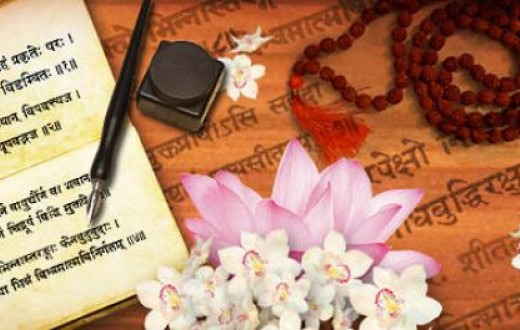Bangalore, India

(Below is a continuation of the post Walk The Path of Truth)
Then comes the next two verses, ‘Bijam mam sarva-bhutanam viddhi partha sanatanam. Buddhir buddhimatam asmi tejas tejasvinam aham. Balam balavatam ch-aham kama-raga-vivarjitam. Dharmaviruddho bhutesu kamo 'smi bharata-rsabha’. (7.10 & 7.11)
People driven by feverishness
project themselves as very
strong,but such strength is of
no use.Strength that comes out
of feverish desires is very
superficial, only on the
surface. This strength is hollow
from inside. There is deep fear
in the minds of such people. And
one can never be strong when
there is fear inside.
There is a seed present in everyone. Every person who comes to this world brings something with him (quality or gift). These are some innate qualities (seeds) in each person that does not change.
Many times you will hear teachers say, ‘Only if the quality is present in the student can I develop it.’
You can only grow something when you have some seeds to begin with. If there is nothing to begin with, how would you be able to develop those qualities?
So Lord Krishna says, ‘This seed that is present in every Jiva (living being) has been there since time immemorial, and it is not something new. It has no beginning and no one knows exactly when it was sown. I am this seed present in all living beings (bhutanam). This is what you should know because every living being, every creature has a seed present inside them. Just as this seed is present since time immemorial, so also all the kivas have existed since time immemorial’.
There are three things that are thought of as both Anaadi (without a beginning) and Ananta (without an end).
One is God, the second is Jiva (here meaning the individual soul or consciousness) and third is Prakruti (Nature).
The Apara-prakruti has been present since time immemorial. It is the same for God and for the Jiva. So the creation is like a circle (vritta); a circle has no beginning and no end, yet at every point there is both, a beginning and an end.
Lord Krishna then explains further, ‘O Arjuna, if you see an intelligent person, do not think that he has acquired his intelligence all by himself. I am the intelligence of the intelligent’.
This was a very clever thing that the Lord did. Where ever the mind can possibly get caught up or attracted to, Lord Krishna brings Arjuna’s mind back from all of those places to focus on Him again and again.
We get very influenced by intelligent people. We think, ‘This person is so intelligent. His intellect is so sharp and he is so knowledgeable’. In this way we start praising that person. So, to bring the mind back, Lord Krishna says, ‘Wherever you see such brilliant intelligence, know that it is Me. It is a manifestation of Me alone’.
By saying this, He brings the mind back to focus on Him. It means that wherever you see sharp intelligence, know that it is Krishna and it has come from Krishna. When you know this, your mind cannot stray anywhere (for it will find everything to be a form of Lord Krishna and stay focussed on Him).
In the same way, He says, ‘I am the Tejas (glory or brilliance) of the powerful. I am the glow you see on someone’s face. I am the strength that you see in a person who is unaffected by cravings’.
One can draw strength even from Dvesh (aversions) and hatred. Such people appear to be very strong. But I am not that. Terrorists and violent people appear to draw great strength from hatred. But Lord Krishna says, ‘I am not that strength (drawn from negativity)’. Terrorists walk with such feverishness. They terrorize others and show off their strength. But such strength is not free from kama (desire) and raga (craving). Where there is craving, there is aversion also. Those who engage in a display of their strength out of cravings are foolish.
Also, people driven by feverish desires appear to display unusually great strength. This is what is usually seen in the world today. People driven by feverishness project themselves as very strong, but such strength is of no use.
Strength that comes out of feverish desires is very superficial, only on the surface. This strength is hollow from inside. There is deep fear in the minds of such people. And one can never be strong when there is fear inside.
The presence of two (duality;
here meaning not being united
within oneself) is the cause of
fear. People who have not
united with the consciousness
within themselves (antarmukhi)
and have not turned inwards
to the Self, such people can
never be called strong. And
when one is filled with cravings
and feverishness, they can
never go inward and unite with
the Self.
One who is not connected to his own consciousness can never be strong. A person who is not connected to his centre and is not aware of his being, even though he may display great strength on the outside, inside he is hollow with fear.
Similarly, strength that comes from hatred and demonic tendencies is also hollow from within. There is a saying, ‘Dwitiya dwai bhayam bhavati’. It means the presence of two (duality; here meaning not being united within oneself) is the cause of fear.
People who have not united with the consciousness within themselves (antarmukhi) and have not turned inwards to the Self, such people can never be called strong. And when one is filled with cravings and feverishness, they can never go inward and unite with the Self. It is only when one becomes centered within oneself that great strength dawns. Such strength is free from the negativity of craving and feverishness and is beyond them. That alone is true strength. This is why Lord Krishna says, ‘Wherever you see such pure strength, know that it is Me’.
Now you might ask, ‘Lord Krishna has said that great strength comes only when one is free of cravings and feverishness. Are all desires bad then? Is having desires wrong, or having a wish for everyone’s wellbeing also wrong. Does that mean that one should not have any desires at all?’ No, it is not so.
Lord Krishna says, ‘I am all those desires that do not go against Dharma (righteousness of duty). All the people who acts in accordance with Dharma and follows their Svadharma (one’s nature or duty that one is responsible for), the desires that arise in such people is Me and Me alone’.
You all might have experienced this: At times when you act upon a desire that arises in your heart, you find that it uplifts you and others as well. Everyone is benefited by it. Such desires are the manifestation of God.
When we act in accordance with Dharma, we cannot commit anything wrong. Moreover, along with Dharma, desires also do arise. But such desires are divine in nature (inspired by divine will).
That is why it is said in the Vedas, ‘Tanmeya manaha Shiva-sankalpamastu’ (May desires benefiting everyone arise in the mind). May I have auspicious desires that benefit everyone. May I have the desire to move towards the truth, and towards all that is auspicious.
Now, the desire for truth is also a desire. If we want to progress higher in life, that too is a desire. Having a desire for everyone’s wellbeing is again a desire. You cannot celebrate festivals without having auspicious desires (for everyone).
You cannot walk even a step in your life without desires. Desires are present behind every action you do in life. There is a cause behind anything you do in life, and the cause is desire. So what type of desire should it be? One that is not in conflict with Dharma but in accordance with it. So Lord Krishna says, ‘I am all those desires that are in accordance with Dharma’.
You all must have experienced this sometime, where you acted upon a desire and the result turned out to be just as you expected, and many people also got relief from your action. There are some desires that arise in you, when you act on them it brings peace and comfort to you and everyone around you. Desires that do not create any conflicts in the mind and are not against Dharma.
Any action of yours that goes against Dharma will prick you inside. It will keep troubling you from within and you will feel, ‘Oh, I think I have done something really wrong’. Your conscience will tell you this. But when you act in accordance with Dharma, then you feel relaxed and at peace.
‘Ye ch-aiva sattvika bhava rajasas tamasas cha ye. Matta eveti tan viddhi na tv-aham tesu te mayi’. (7.12)
Lord Krishna says, ‘O Arjuna, the three gunas, Sattva, Rajas and Tamas are all born from Me. But neither am I in them and neither are they in me, yet they have all come from Me. This is what you should know’.
This is a very strange thing. Lord Krishna says, ‘I am not governed by the three gunas and neither do the three gunas reside in Me, yet they have come into existence from Me alone’. There is a great scientific truth behind this. When you go deeper into understanding this, you realize that when you become a witness to the play of the three gunas, you become separate from them all.
So He says, ‘Though they (the three gunas) are separate from Me, yet they are an extension of me’.
I wear the cloth on my body but I am not the cloth and neither am I a part of the cloth. This example comes closest to understanding this.
Just like how we wear clothes on our body, but we do not become our clothes and neither are we a part of the clothes, yet the clothes belong to us. Have you understood this?
Lord Krishna has said that
great strength comes only
when one is free of cravings
and feverishness. Are all
desires bad then? No, it is
not so. Lord Krishna says,
‘I am all those desires that
do not go against Dharma
(righteousness of duty).
Lord Krishna says, ‘It is I who has created these three gunas (the cloth), and they belong to Me, yet I am not influenced by them and neither do they reside in Me and I am also not these three gunas. So, O Dhananjaya (another name for Arjuna meaning conqueror of great riches), you too should become a witness to the three gunas. You should understand them to be a part of My divine nature. They have been created by Me and it is I who upholds them, yet I am not these three gunas’.
Just like how you have different pieces of clothing for different parts of the body, shoes for the feet, inner clothes and outer clothes for the body, a turban for the head, in the same way all gunas have their own distinct qualities.
Now if you try to keep you turban on your feet, or wear hand gloves on your feet and the socks on your hands, it simply won’t work. Each piece of clothing has its own distinct place and cannot be worn anywhere else.
So Lord Krishna says that, ‘Each of the three gunas have their own distinct qualities and their own place, and they have all come from Me, yet I am not these. So do not go looking for Me in them, for I am beyond them’.
Do you know what Lord Krishna is doing? He is retrieving Arjuna’s mind from all the possible places that it can get attracted to, and bringing it back to focus on Himself. That is why there is both knowledge and science involved in this, and this is what is unique about this discourse.
So using this Vishesha Gyaan (special knowledge), Lord Krishna repeatedly retrieves Arjuna’s mind from anywhere it can get attracted to and pulls it back to Himself. It means He brings the mind back inwards to focus on the consciousness. This is the job of the Guru and the responsibility of the disciple.
So wherever one sees great strength, one should recognize it as belonging to God, and not of the person who displays it. Wherever one finds beauty, one should not think of it as belonging to the person but recognize God behind that beauty. There can be no beauty without God. That is why it is said, ‘Satyam Shivam Sundaram’. That is, wherever there is Lord Shiva (God), that is where there is beauty and truth.
So by saying this, Lord Krishna frees Arjuna’s mind from every possible attraction and pulls it towards Himself.
Krishna means attraction; it means one who attracts everything to Himself. Freeing the mind from all possible places it can wander towards out of attraction and bringing it to the centre – this is what Lord Krishna is. So wherever you see someone glowing like a Tej-punj (glowing with spiritual grace), know that they are deeply in love with Lord Krishna, which is why they draw everyone to themselves. It means withdrawing the mind from the world of diversity that is due to the three gunas, and bringing it back towards the pure consciousness within. This is a very unique step and an astonishing science.
(Click Here to Continue Reading.)
(Note: The discourse was given in Hindi. Above is a translation of the orginal talk.)





















































